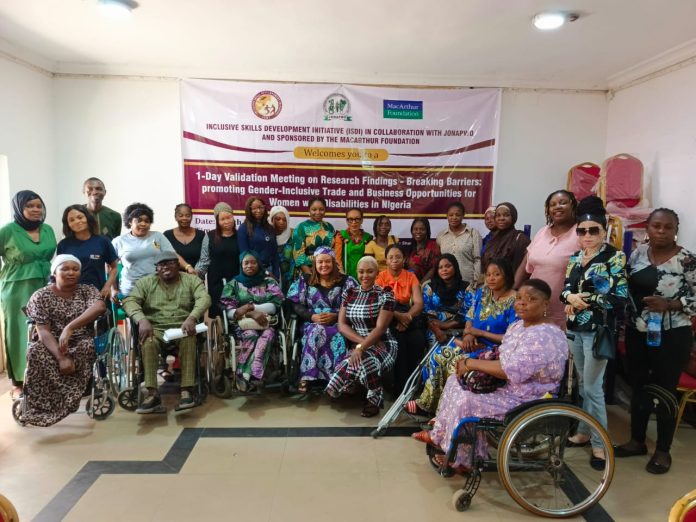Abuja, Nigeria – March 20, 2025
In a bold move to advance economic inclusion, the Inclusive Skills Development Initiative (ISDI) has unveiled its latest research titled “Breaking Barriers: Promoting Gender-Inclusive Trade and Business Opportunities for Women with Disabilities in Abuja, Nigeria.” The presentation and validation of this pivotal study took place at Jasmine Hotel and Suite in Abuja, drawing together key stakeholders in finance, disability rights, and media to chart a new course for inclusive economic growth.
ISDI’s Vision for Inclusive Economic Empowerment
In her opening remarks, Mrs. Angelina Ugben, Executive Director of ISDI, emphasized the organization’s unwavering commitment to dismantling systemic obstacles that hinder women with disabilities from thriving in business:
“Today marks a significant step toward illuminating and addressing the challenges faced by women with disabilities in trade and business. Through this research, ISDI reinforces its mission of fostering gender equality, economic empowerment, and inclusive prosperity.”
She extended deep appreciation to ISDI’s partners, notably the Joint National Association of Persons with Disabilities (JONAPWD), and acknowledged the critical support of funders, the MacArthur Foundation. Special recognition was given to the courageous women with disabilities who shared their lived experiences, anchoring the research in authenticity.
Research Findings: A Glimpse into Persistent Barriers
Presenting the research findings, Evelyn Ugbe, the consultant commissioned by ISDI, highlighted several entrenched challenges:
- Socio-Cultural Stigma & Discrimination: Women with disabilities continue to face prejudice rooted in outdated stereotypes. Their capabilities are often overshadowed by their disabilities, with many customers patronizing their businesses out of pity rather than recognizing their entrepreneurial competence.
- Financial Constraints: The study found that financial institutions frequently classify women with disabilities as high-risk borrowers, denying them access to vital loans and credit facilities. Consequently, many are forced to rely on informal savings systems, family, or friends—resources insufficient to scale their businesses.
- Physical & Systemic Barriers: Infrastructural limitations, such as inaccessible buildings and banking halls, coupled with communication barriers for Deaf and Blind individuals, further exclude women with disabilities from essential financial services.
- Policy Gaps: Current policies inadequately address the unique economic challenges faced by women with disabilities, with weak enforcement mechanisms failing to provide adequate support.
- Educational & Technological Barriers: Limited access to inclusive training opportunities and inaccessible digital platforms hampers skill acquisition and business growth.
ISDI’s Roadmap: Key Recommendations for Change
In line with its commitment to creating lasting impact, ISDI’s research proposes several strategic interventions:
- Enhancing Accessibility: Improve physical infrastructure in financial institutions and marketplaces, ensuring ramps, elevators, and accessible digital platforms are in place.
- Capacity Building: Train financial institutions on disability inclusion, equipping them to better serve women with disabilities.
- Developing Targeted Financial Products: Establish loan schemes specifically tailored to the needs of women with disabilities.
- Promoting Inclusive Policies: Strengthen policy frameworks to explicitly include the economic rights and needs of women with disabilities.
- Expanding Representation: Foster the inclusion of women with disabilities in business associations and networks to amplify their influence.
- Raising Public Awareness: Launch media campaigns to challenge stereotypes and highlight the contributions of women with disabilities to economic growth.
- Fostering Collaboration: Encourage partnerships between government agencies, private sector players, and civil society organizations to build a robust support ecosystem.
- Monitoring & Evaluation: Implement measurable indicators to assess progress and ensure accountability.
Stakeholders’ Engagement: A Collective Responsibility
The event attracted key financial stakeholders, including representatives from Access Bank and Zenith Bank, disability rights advocates—many of whom are women with disabilities—and media practitioners. Their presence underscored a shared recognition of the urgent need to create an enabling environment where women with disabilities can flourish economically.
Mrs. Ugben called on all participants to actively engage in refining and implementing the research findings:
“ISDI remains steadfast in its mission. We cannot overlook the immense potential of women with disabilities. Breaking these barriers is not just a social obligation; it’s an economic imperative.”
As ISDI continues its advocacy, this research stands as a clarion call to policymakers, financial institutions, and society at large to work collaboratively toward dismantling the systemic roadblocks that have long sidelined women with disabilities.


